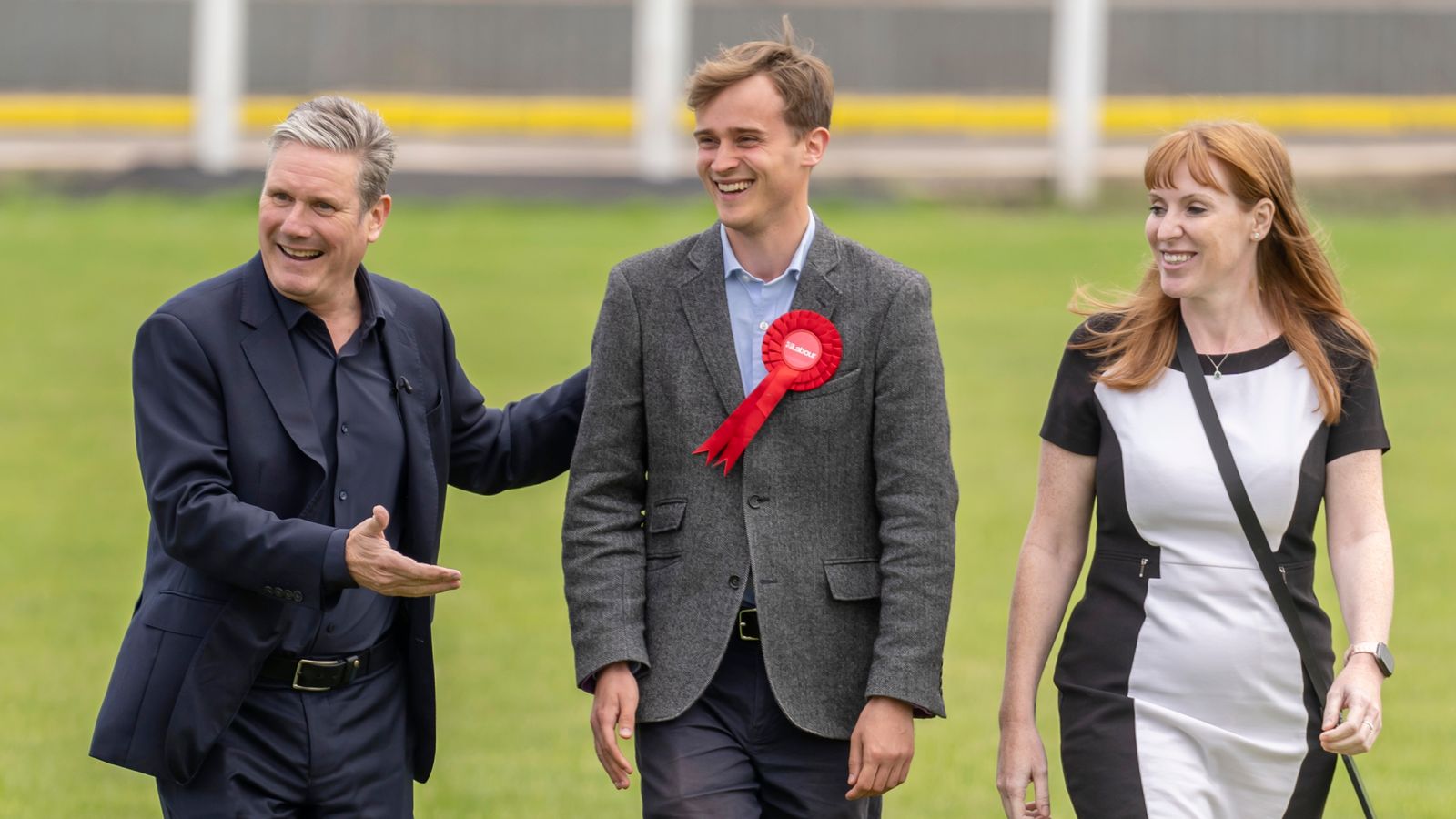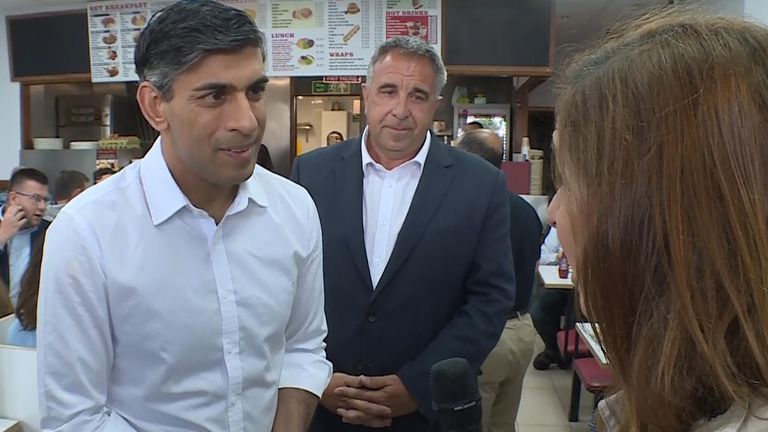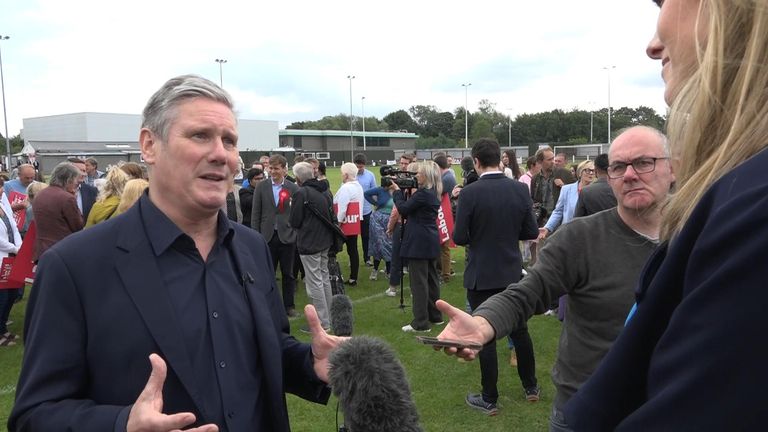The Conservatives have suffered two by-election defeats in what had been seen as safe seats.
Labour won in the constituency of Selby and Ainsty, while the Liberal Democrats triumphed in Somerton and Frome.
The opposition parties both overturned Tory majorities of about 20,000 – as polling experts said the results meant “deep electoral trouble” for the Conservatives.
Politics latest: Minister a ‘twit’ for Inbetweeners remark about new MP, says Labour frontbencher
Rishi Sunak said the next general election was not a “done deal” as his party was able to narrowly hold on to Boris Johnson’s old Uxbridge and South Ruislip seat. Despite predictions of a Labour victory in west London, Mayor Sadiq Khan’s plan to expand the Ultra Low Emission Zone (ULEZ) to the capital’s outer borough angered people on the doorstep.
So is Labour on course to win power and how much are Mr Sunak’s predecessors Liz Truss and Mr Johnson to blame for the PM’s woes? Chief political correspondent Jon Craig and political correspondents Tamara Cohen and Rob Powell have been answering readers’ questions on the by-election results.
:: Is Labour set to win the next election?
Tamara Cohen: Well, the short answer is it’s looking encouraging for Labour, but it’s difficult to predict general election results from by-elections, especially when the general election could be more than a year away.
But the clear swing is away from the Tories in three very different parts of the country. Labour needs a 12% swing nationally for a majority; and even if what we saw in Uxbridge and South Ruislip is replicated nationally they could be the largest party in a hung parliament.
But there is a long way to go and the extent of Labour’s recovery in Scotland – still untested – will be crucial.
:: Have Truss and Johnson doomed Sunak?
Rob Powell: Boris Johnson and Liz Truss have inflicted a lot of damage to the Tory brand and that is undoubtedly harming the current government.
Polling shows voters blaming the Tories for spiralling mortgage costs and not looking fondly on the chaos of the last few years.
So far, Rishi Sunak has spent a lot of time steadying the ship and putting out fires.
But he’ll need to start offering more of a vision for what he wants to do for the country if he wants to avoid a thumping defeat next year. No 10 is suggesting that phase of his premiership will start after the summer.
Labour is also facing a similar problem, though.
Sir Keir Starmer spent the first half of his time in office trying to restore Labour as a credible party of government in the eyes of many voters. While that’s worked to an extent, pollsters say many complain that they still don’t know what he believes in or stands for.
Some Labour MPs and trade unions want him to lay out a more solid plan as well and not just stand back and hope the Tories lose the next election.
:: Will there be an imminent reshuffle, with the PM changing his top team?
Tamara Cohen: From what I’m hearing, no.
The thing about reshuffles is you never really know when they are going to happen, but while both the Conservatives and Labour will want to refresh their top teams before the election, doing so after a night that both are trying to spin as a victory looks like panic.
:: Will constituency changes affect the next general election?
Jon Craig: Oh yes! Most certainly. And ironically, two of the biggest casualties are seats contested in this week’s by-elections: Somerton and Frome, and Selby and Ainsty.
The aim of boundary changes is to reflect changes in population as, traditionally, inner city constituencies lose voters and the suburbs and towns with new housing gain them.
The idea is that each constituency should have between roughly 70,000 and 77,000 voters. That means some rural seats are vast, with claims that they have more sheep than voters.
This time there’s been a big shake-up because the boundaries haven’t changed since 2010 and only 65 of the 650 Westminster seats will be unchanged.
Somerton and Frome is being carved in two new constituencies, Glastonbury and Somerton, and Frome and East Somerset.
Selby and Ainsty is being split four ways, though most of its electorate will stay in a new Selby constituency. Uxbridge and South Ruislip, on the other hand, is affected by only minor changes.
Reflecting population moves, the East Midlands, east of England, London, the South East and South West get more seats. The North West, North East and West Midlands will have fewer, and Yorkshire keeps the same.
Normally, governments make sure their party benefits from boundary changes.
This time is no different. It’s estimated that the Tories will benefit by five or 10 seats as a result of the changes.
:: Does the Liberal Democrats’ victory in Somerton and Frome show they are set for a big comeback?
Rob Powell: Before being decimated after the coalition years with the Tories, the South West was a heartland for the Lib Dems.
This win – combined with similar victories in local elections in the area – suggests the bad taste left by the coalition has faded and voters here are prepared to give them a go again.
That doesn’t mean all four of the Lib Dem MPs who won their seats in by-elections in the last two years or so will retain them at the general election.
But the results do suggest the Lib Dems can expect to bank some wins in the broader region next year.
So expect the Lib Dems to frame themselves as the main challenger to kick the Tories out in target constituencies.
They’ll pick out local policies to campaign on, as well as continuing to focus on national issues such as the NHS and cost of living.
:: How likely is a snap general election?
Jon Craig: The next election has to be called within five years of the last.
That means it could, in theory, be as late as January 2025, since the last one was in December 2019.
What normally triggers an early general election is when a government starts losing votes in the Commons, culminating in losing a vote of no confidence in the government, as happened to James Callaghan’s government in 1979.
But in spite of all Rishi Sunak’s current difficulties, his government isn’t losing any Commons votes, partly because every time he faces a big Tory rebellion he caves in and ducks a clash with his backbenchers.
So with inflation now beginning to fall, Mr Sunak obviously feels perfectly entitled to say, as he did last month: “We’ve got to hold our nerve, stick to the plan and we will get through this.”
Opposition leaders always demand a general election immediately and Sir Keir Starmer is no exception. But it ain’t going to happen while Mr Sunak has a hefty majority in parliament.
:: Is there going to be a deal between Labour and the Liberal Democrats?
Rob Powell: If you’re talking about tactical voting, then both leaders insist they aren’t stepping aside to allow other parties through.
On the chances of the two parties forming a coalition after the next election, I’m not convinced anything solid has been reached behind the scenes, but be in no doubt it will be on the minds of both leaders, because the chances of Labour ending up as the largest party but without a majority are high.
Lib Dem success is already bringing questions about whether they would support a Labour government into power.
Sir Ed Davey isn’t keen to talk about that, but notably didn’t rule it out today when I asked him about it several times.
Labour leader Sir Keir Starmer is also very woolly on the subject as while he’s explicitly said no deal with the SNP, the possibility of teaming up with the Lib Dems is more vague.
So both sides are leaving the options open. Expect questions to get more pointed as polling day nears.
Click to subscribe to the Sky News Daily wherever you get your podcasts
:: Will parties struggle to implement green policies after the impact of ULEZ in Uxbridge?
Tamara Cohen: That’s a really good question, and one Labour are grappling with.
Angela Rayner said low emission zones remained the right idea, but her party needed to reflect on how to help people “do the right thing” without penalising those who can’t afford a new car.
Whether it’s Tory battles over wind farms, traffic schemes or the move to electric cars, these contests are a warning to both parties that they’ll need to take voters with them on environmental policies.
:: Does Labour have the power to overrule London Mayor Sadiq Khan’s ULEZ scheme?
Tamara Cohen: The ULEZ scheme is already in place in central London and its expansion to the outer boroughs, which is due to happen at the end of August, is subject to a High Court challenge by five London councils including Hillingdon – where the Uxbridge by-election took place.
We may hear the result later in the summer.
Labour’s candidate in Uxbridge called for a delay in the implementation and a more extensive scrappage scheme, not ditching it altogether.




